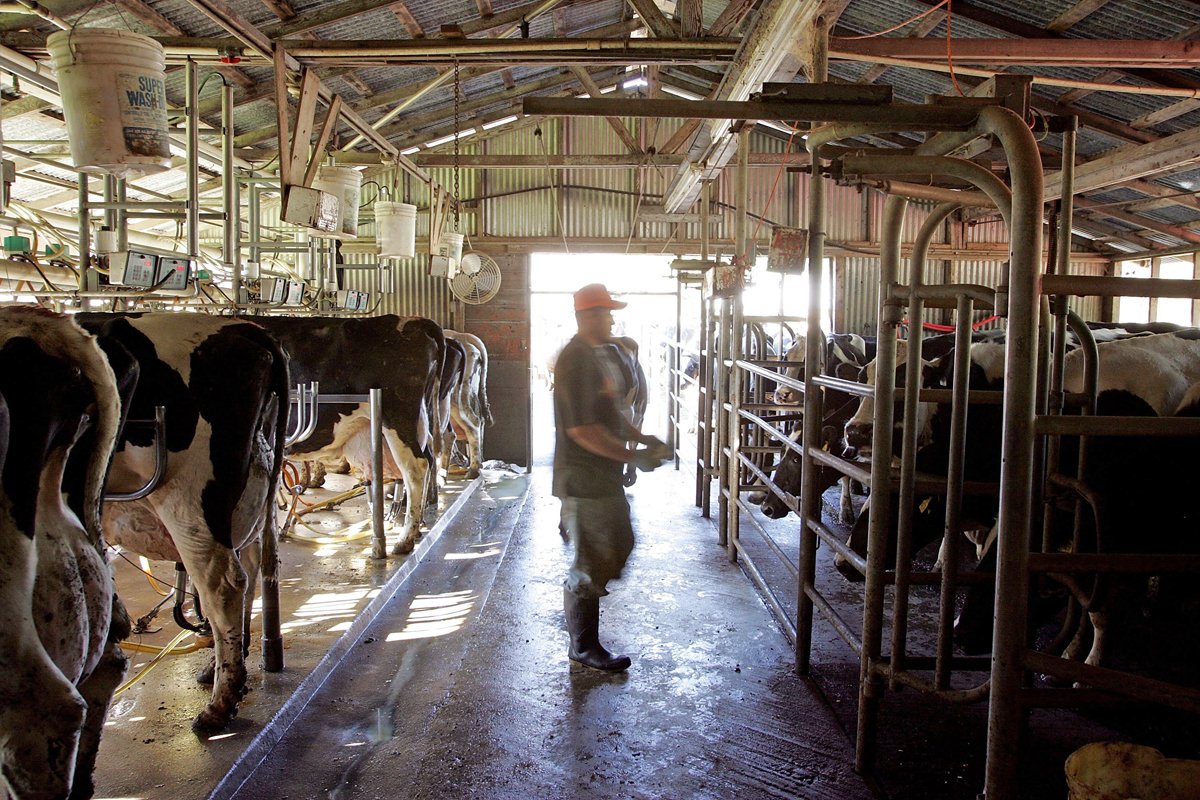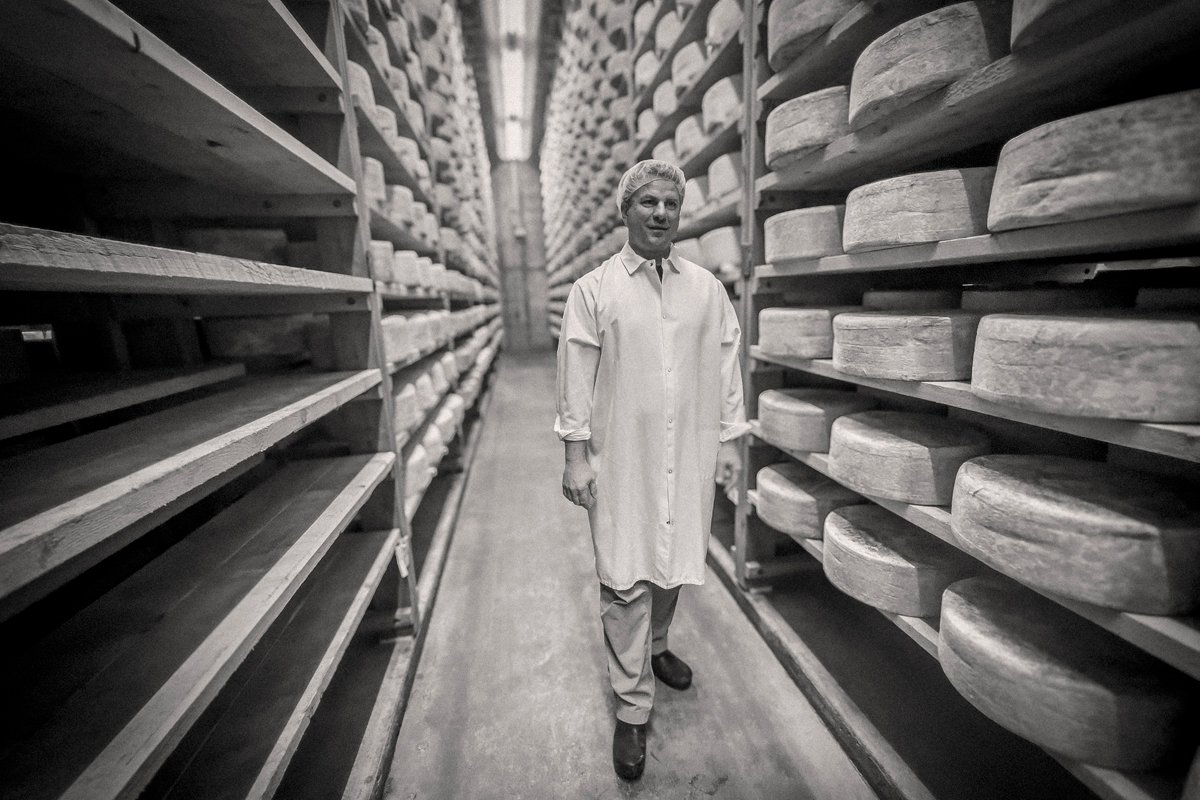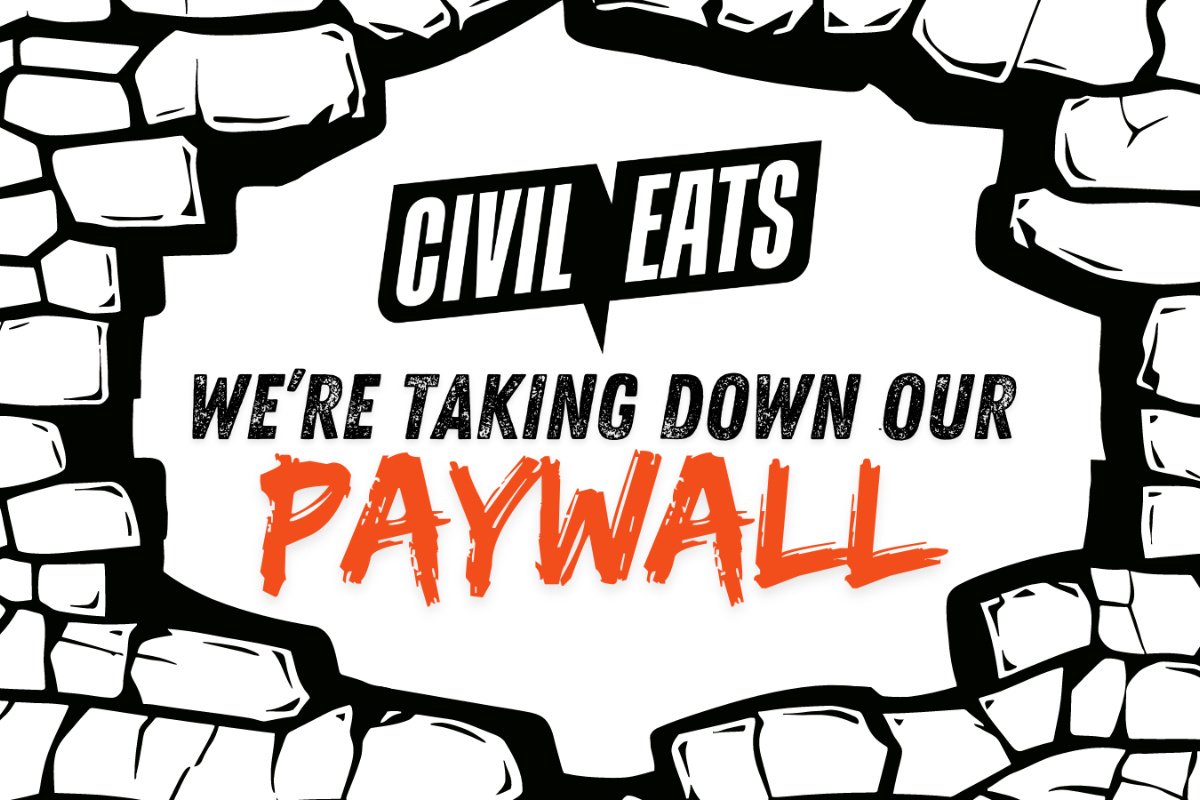A 2022 Civil Eats investigation found that a budget rider that prohibits OSHA from spending money to regulate small farms leaves most animal-ag operations without oversight. Lawmakers appear poised to renew the rider once again.

A 2022 Civil Eats investigation found that a budget rider that prohibits OSHA from spending money to regulate small farms leaves most animal-ag operations without oversight. Lawmakers appear poised to renew the rider once again.
July 12, 2023

Photo credit: Justin Sullivan/Getty Images
Members of Congress will likely reapprove a policy that may be obscuring the deaths of hundreds of animal agriculture workers—and which leaves the vast majority without any oversight or protection—despite concerns from worker advocates and a key legislator.
A little-known appropriations rider has been attached to the budget of the federal Occupational Safety and Health Administration (OSHA), the agency that oversees the American workforce, every year since 1976. The rider prohibits OSHA from spending money to regulate or investigate injuries or deaths that happen on small farms that do not have temporary labor camps.
Small farms are defined as those with 10 or fewer employees. Because the industry has consolidated operations over the last few decades, however, the rider reaches far beyond farms that could colloquially be called “small.”
“The rider puts small farm workers, who are already part of one of the country’s most dangerous workplaces, in harm’s way, with an outsized impact on racial and ethnic minorities.”
Instead, it often excludes from protection workers employed by complex corporations that are responsible for hundreds or thousands of animals on large farms—farms that, because of automation, employ very few people. This circumstance leaves those workers no way to report unsafe conditions and no recourse for them or their families if they are injured or killed.
Last year, a Civil Eats investigation revealed the scope of the rider’s reach: It exempts the vast majority—96 percent—of meat, dairy, and poultry operations that hire workers in the U.S. from OSHA oversight. And yet, between 2011 and 2020, around 85 percent of the deaths associated with animal agriculture happened at operations not under federal OSHA’s jurisdiction. During that decade, 1,006 people died in the animal agriculture industry, and only 149 of those deaths were investigated by the federal agency.
Since 2003, our investigation found, more than 13 people have drowned or asphyxiated in manure pits at dairies. Others have died after being attacked, gored, or trampled by cows or bulls, getting entangled in or run over by heavy machinery, or suffocating in piles of hay, grain bins, and silos. Many workers have also lost fingers, arms, and legs in accidents. And some have mistakenly injected themselves with vaccines meant for animals or drunk poisonous chemicals from unmarked containers thinking they were water.
President Joe Biden nevertheless included the rider on the first page of the proposed OSHA budget presented to Congress in March. Congress deliberates, then approves the nation’s budget annually before October 1. The White House did not respond to questions about Biden’s decision to continue to exclude workers at small dairy, poultry, and livestock operations from OSHA protections.
OSHA said officials take seriously their mission to keep workplaces as safe as possible and, faced with the small-farm rider, the agency “tries to utilize whatever remaining tools we have” to protect all agricultural workers.
A spokesperson for the president referred general questions about the OSHA budget to Doug Parker, OSHA’s assistant secretary of labor. Parker said OSHA officials take seriously their mission to keep workplaces as safe as possible and, faced with the small-farm rider, the agency “tries to utilize whatever remaining tools we have” to protect all agricultural workers.
The agricultural lobby, led by organizations like the American Farm Bureau Federation, has long led the charge to oppose regulation and worker protection, including efforts to remove or adjust the small-farm rider.
Republicans generally say they support the rider as a means of upholding the agriculture industry and rural economies, although the small farms purportedly bolstered are in decline as farms consolidate. And though Democrats have voiced support for underrepresented workers in other industries, few have been willing to take on the small-farm exemption.
Representative Rosa DeLauro (D-Connecticut), who has led previous efforts to remove the rider from House budgets, continues to insist on its removal. “The rider puts small farm workers, who are already part of one of the country’s most dangerous workplaces, in harm’s way, with an outsized impact on racial and ethnic minorities,” DeLauro said. “There is no good reason OSHA should not be able to monitor 96 percent of animal-ag operations. We need to bring our regulations into the 21st century and protect workers.”
The Coalition of Immokalee Workers (CIW), which created the Fair Food Program to improve conditions for farmworkers picking tomatoes in Florida, also believes all agriculture workers should have government protection. “The size of an employer or agricultural operation—regardless of the subsector of the economy to which it belongs—should not determine whether workers have a safe and dignified workplace,” said Lupe Gonzalo, CIW’s worker education team leader. “All work has dignity, and no farmworker should have to forfeit their human rights when they go to work.”
Limiting OSHA’s oversight of workers on farms is part of a larger partisan pattern of targeting and limiting the federal agency. In its first four years of operation, for instance, eight Congressional committees held more than 100 oversight hearings looking to restrict or abolish the agency.
Today, OSHA still lacks jurisdiction over public employees, and numerous other riders limit its ability to regulate workplaces and assign penalties, including a rider on small employers in so-called “low-hazard industries,” whose employees miss less work due to injury than the national average.
In January, Representative Andy Biggs (R-Arizona) attempted to curtail OSHA further by kicking off the current legislative session with the introduction of a bill to abolish the agency.
“In this political climate, accepting the small farm exemption is a nod to the unfortunate political realities of funding OSHA.”
None of the six Republicans with either rank or influence on key budget committees responded to Civil Eats’ questions about their stance on the rider. But now that Republicans hold the majority in the House, experts say the rider’s elimination seems especially unlikely.
Debbie Berkowitz, who spent six years as chief of staff and then a senior policy adviser for OSHA during President Obama’s administration and who now serves as a practitioner fellow with the Kalmanovitz Initiative for Labor and the Working Poor at Georgetown University, said that OSHA’s existence is often questioned, making it difficult to try to add to the agency’s regulatory powers.
“In this political climate, accepting the small farm exemption is a nod to the unfortunate political realities of funding OSHA,” Berkowitz said.
With many pressing issues before Congress—such as states reducing child labor protections, for example—the rider, which affects a mostly immigrant workforce, is not where lawmakers want to spend their political capital, said Peg Seminario, director of occupational safety and health for the American Federation of Labor and Congress of Industrial Organizations (AFL-CIO) from 1990 to 2019.
“They are aware of the political situation with the votes that are there and that it’s just not possible in this climate,” Seminario said. “You focus on things that are possible.”
Seminario sees the introduction of the rider in President Biden’s proposed OSHA budget as a move designed to pacify detractors. It’s the White House’s way of saying, “‘We’re not going to make a fight over this,’” she said, in order to avoid jeopardizing other priorities.
Nevertheless, Emma Scott, associate director of the Harvard Food Law and Policy Clinic, believes the issue of eliminating the small farm rider could be timely.
“There’s additional attention coming to child labor in the farming sector, so it’s a good opportunity to bring attention to the kinds of policies that foster this risky environment,” Scott said. “But it can be one of those things that people seem to feel, because it’s been one way for so long, there’s nothing that anyone can do—even though policymakers could.”
Because of the current balance of power in Congress, there is little momentum to remove the near 50-year-old small-farm rider. But in the last three years, the exemption has faced a challenge to its existence for the first and only time in its history.
Under Representative DeLauro’s leadership—and with Democrats in control of the House—in fiscal years 2020, 2021, and 2022, the House passed appropriations bills that kept the small-farm and other riders out of the OSHA budget. In each of those three years, however, the rider was added back in during House and Senate budget negotiations.
“There are a lot of opportunities for not just mischief, but for real damage in the appropriations process,” Seminario said. “The thing about appropriations is there are hundreds of amendments that get filed to a bill. There’s a lot of back and forth during this process between staff, between the majority and the minority. There’s a lot of horse-trading that goes on” as lawmakers sacrifice lower priorities for higher ones.
The fact that the rider is enmeshed with other issues—and that budget negotiation is such a massive, complicated process—also works against its chances of removal, Seminario said. “The whole government is in play,” she said.
Since getting rid of the small farm rider would be part of the same budgeting process as getting rid of something like the Hyde Amendment, which prohibits funds from being spent on abortion, the two issues could potentially be pitted against each other. “Which one is going to win?” Seminario said. “There are a lot of other things that are a whole lot more important to people than worker safety.”
“The agriculture industry has enormous power over the federal government—Democrats as well as Republicans.”
Likely for this reason, nearly a dozen of the lawmakers we contacted declined to comment on the issue, including those often willing to take a stance on labor issues—Senators Cory Booker (D-New Jersey), Kirsten Gillibrand (D-New York), Bernie Sanders (I-Vermont), and Elizabeth Warren (D-Massachusetts).
As to the White House’s inaction in its own budget, “It’s disappointing, but it’s not surprising,” said Jordan Barab, who was deputy assistant secretary of OSHA from 2009 to January 2017 and a senior labor policy advisor to the House Education and Labor Committee for two years after that.
“The agriculture industry has enormous power over the federal government—Democrats as well as Republicans,” said Barab. “So, it’s extremely difficult, or impossible, to get anything through Congress or even sometimes through a regulatory process, that faces strong opposition from the agriculture community.”
That agricultural lobby is stronger than ever. The meat and dairy industry—which has consolidated so deeply over the last few decades that four companies control the majority of the market in each industry—has powerful sway in Washington.
Meat, poultry, and dairy companies and their associated trade groups, including the American Farm Bureau, spend heftily to influence policy, generally promoting an anti-regulatory agenda. In 2021, for example, Tyson Foods spent almost $2 million lobbying at the federal level, and the National Pork Producers Council spent $2.2 million.
Meanwhile, isolated behind barn walls in rural areas, animal-ag workers are not organized and have no such advocates to counter the tide.
“All the OSHA rules that I am aware of pretty much—in general industry, and many of the ones in construction—come from the unions pushing for them, petitioning,” said Seminario of the AFL-CIO. “And who is there advocating on behalf of farmworker and agriculture rights? Not a lot of people. There’s not the organized worker power that there has been in some of these other sectors.”
Over the decades, a few lawmakers have tried to make targeted adjustments to the protections the rider denies—allowing OSHA to investigate deaths, but not impose penalties, on small farms if the victims were children, for example, and passing labor laws designed to protect children from dying on farms. The agricultural lobby, however, has pushed back—and defeated—the attempts at incremental change.
Agricultural lobby groups and animal agriculture corporations have demurred comment on this issue, with only the National Pork Producers Council (NPPC) responding to questions. A NPPC spokesperson did not comment directly on the OSHA rider but instead pointed to voluntary safety programs like the USDA’s Pork Quality Assurance Plus (PQA Plus), which provides on-farm certification covering animal well-being and worker safety, as evidence of support for laborers.
“Nothing is more valuable to the success of our industry than having trained, knowledgeable workers to keep America’s pig farms operating safely,” the spokesperson said.
In 12 states and Puerto Rico, state-run OSHAs don’t observe the federal exemption in place everywhere else. If the rider was eliminated at the federal level as well, OSHA would receive reports about hospitalizations and fatalities from small farms across the U.S. and would be in a position to respond and investigate where needed. According to Barab, even if OSHA did not receive a huge boost in funding, the additional attention on small farms “would encourage compliance even over and above the actual ability of OSHA to inspect,” he said.
Some policy experts see incremental tweaks—investigations that respond to critical emergencies, for example, or that respond to small farm deaths without issuing penalties—as potentially valuable if the rider cannot be eliminated.
“These workers do some of the most dangerous jobs in the country,” Barab said, “and there’s absolutely no reason why you should have fewer rights because you work for a small entity than if you work for a larger entity, especially when it comes to such dangerous work. The whole thing is unjustified. It’s an outrage. Workers are dying needlessly because of this rider.”
While worker advocates and lawmakers do not expect movement on the issue under the current political conditions, Barab believes momentum could develop if Democrats controlled both chambers and had 60 votes in the Senate. “I’m sure it’s possible that under a better political environment, there could again be proposals to remove the rider,” Barab said. “I wouldn’t rule it out at all.”

September 4, 2024
By paying top dollar for milk and sourcing within 15 miles of its creamery, Jasper Hill supports an entire community.
September 3, 2024

August 27, 2024

August 26, 2024

Like the story?
Join the conversation.